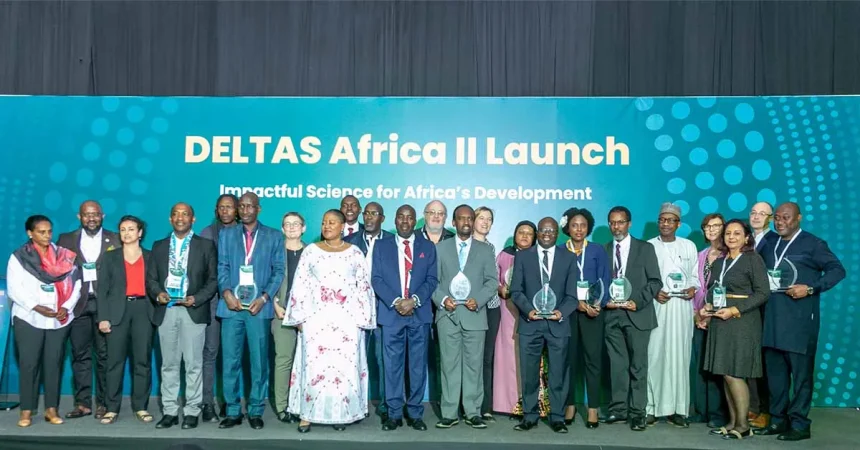The Deputy Programmes Director of the Science for Africa Foundation (SFA Foundation), Dr Alphonsus Neba has thrown light on a novel science capacity development programme for research scientists from Africa which seeks to identify young and vibrant researchers and guide them in obtaining funding for their research work to expand the frontiers of research on the continent.
The DELTAS Africa ( Developing Excellence in Leadership, Training and Science in Africa) programme is a long term, multi-million dollar programme launched in 2015-2022 to support collaborative consortia led by Africa-based scientists to amplify Africa-led development of world-class research and scientific leaders on the continent, while strengthening African institutions.
Speaking on the sidelines of the 2023 WACCBIP Research Conference held between July 26 – July 29, 2023 at the University of Ghana, Dr. Neba explained that the programme was designed to eliminate financial barriers which hamper the conduct of high quality research in African countries whilst helping research institutions across the continent to source funding from development partners interested in helping support the work of scientific research in Africa.
“The DELTAS (Developing Excellent Leadership in Training and Science in Africa) programme is a long term initiative designed to identify and fund globally competitive research leaders across the continent to conduct research in critical areas such as biostatistics, mental health, malaria and tuberclosis, immunology, climate change, neglected tropical diseases and a host of others to bring up innovative knowledge to inform public policies targeted at addressing existing challenges in local communities.
He also explained that the programme’s goal is to ensure that these research institutions are able to achieve excellence in their research innovations through mentorship as well.
“The concept is developed on a hub and scope basis where the hub refers to a centre of excellence in a particular research area of global repute. The hub is tasked by the Foundation to identify other institutions it can mentor on the continent to reach its levels and help empower those organizations to be able to grow individually to excellence in research innovations; like in the case of the recent award received by WACCBIP here at the University of Ghana and their partners in Guinea and Liberia to expend the frontiers of research in their respective jurisdictions.”
Dr Neba also drew light on the programme’s approach to diversity, where African countries which are relatively advanced in terms of research are engaged to partner less developed ones in the field of research to enable knowledge transfer and empower the next generation of scientists from the continent.
“The programme has been designed to be all inclusive to all countries to achieve better impact of research on the continent. On that score, low income countries like Guinea Bissau, Liberia and Sierra Leone have institutions selected to partner middle income countries like Ghana and Cote D’Ivoire science centres of excellence to build capacity of young scientists and bridge the knowledge gap back home whilst obtaining middle level world class trained scientists to push the innovation drive to solve niggling policy gaps.”
He was very appreciative of the massive support the programme has received through science biased grant foundations like the ‘Welcome Trust of the United Kingdom’, which happens to be the biggest science research grant institution across the globe. He deliberated on how such support has helped sustain the appetite of scientists in Africa.
“We want to acknowledge the massive help financial and human resource wise given to us at the Science for Africa Foundation and other like minded institutions dedicated to pushing high quality research work on the continent. This goes a long way to spur on excellent minds to accept a career in research fields and think outside the box in addressing issues that affect the collective issues facing their countries. We are grateful to them all, especially to the Welcome Trust UK, which is the largest private sector funded research organization in the world for the unrivalled support and determination to step into unchartered territories in funding high quality research in Africa.”
Science for Africa Foundation (SFA Foundation) is a pan-African, not-for-profit, public charitable organisation created to support, strengthen, and promote science and innovation in Africa. SFA is committed to improving the quality of lives of African people and to promote the uptake of research in communities, industry, and the public sector.
The goal of the SFA Foundation is to address the continent’s most pressing developmental needs by generating knowledge that solves problems and informs decision-making. SFA serves the African research ecosystem by funding excellent research and innovation ideas; enabling interdisciplinary collaboration among researchers and building and reinforcing environments that are conducive for scientists to thrive and produce quality research that generates new, locally relevant knowledge.
–
Story by | Sika Togoh | univers.ug.edu.gh

